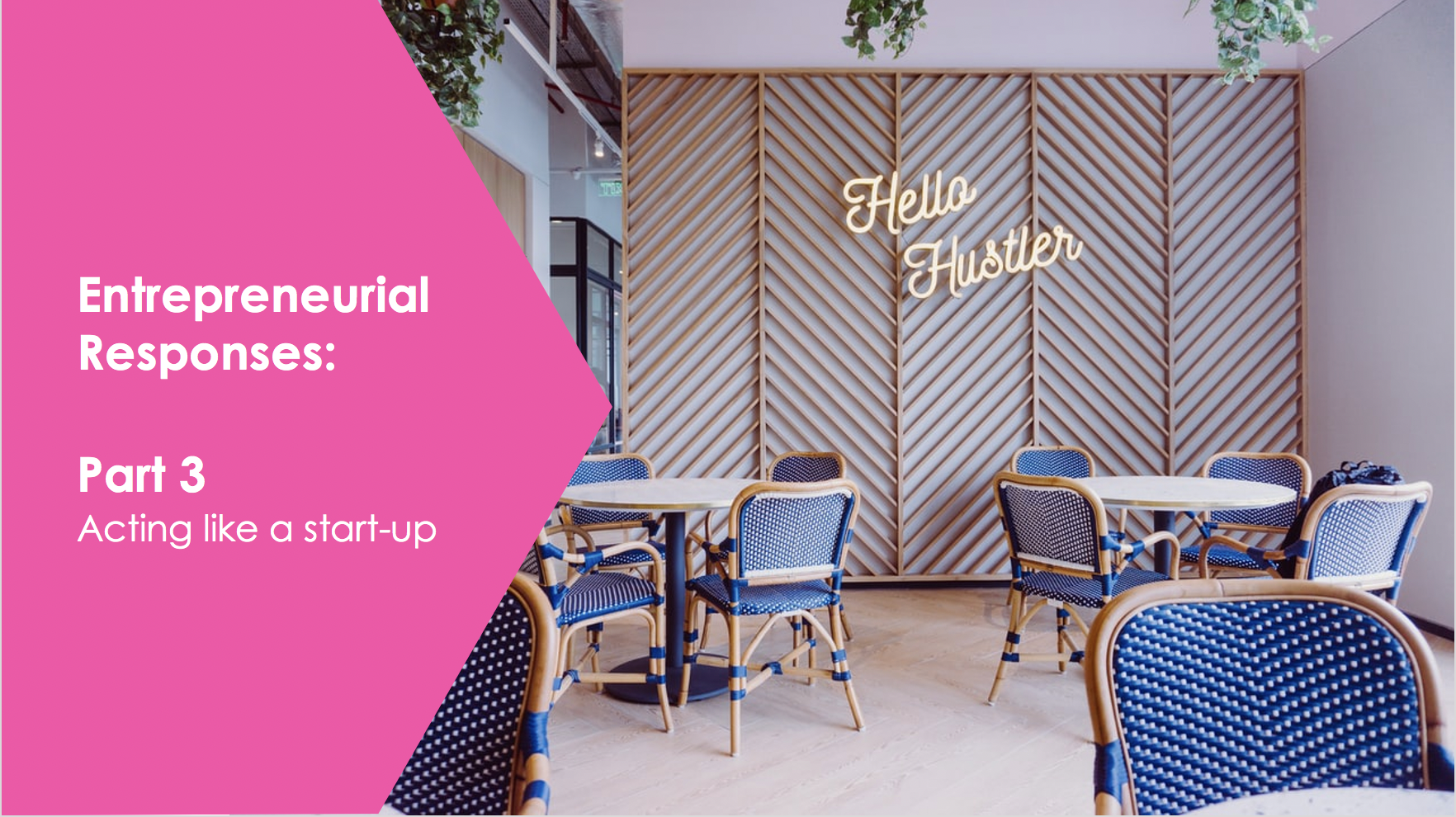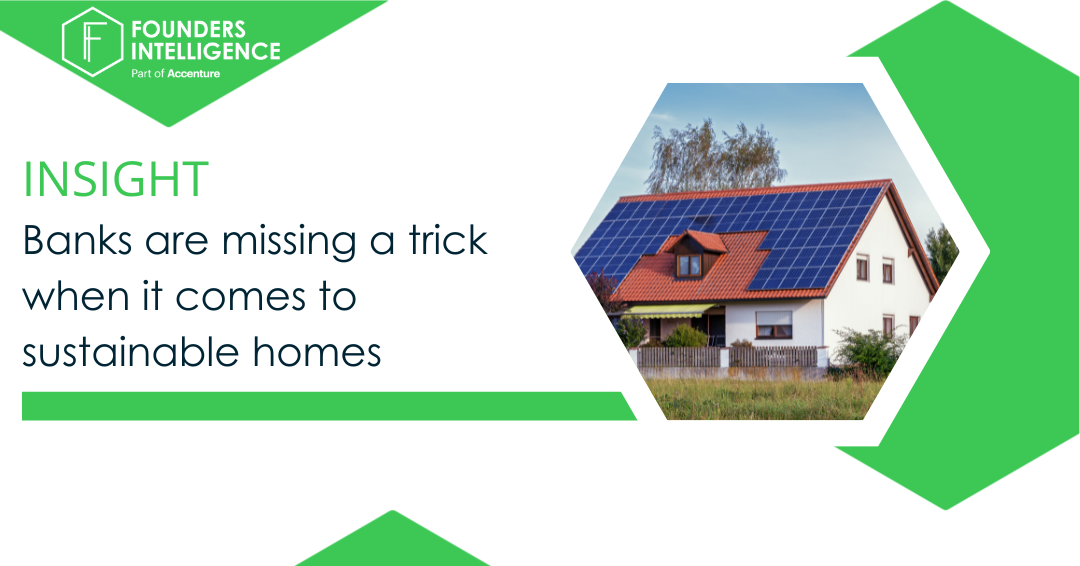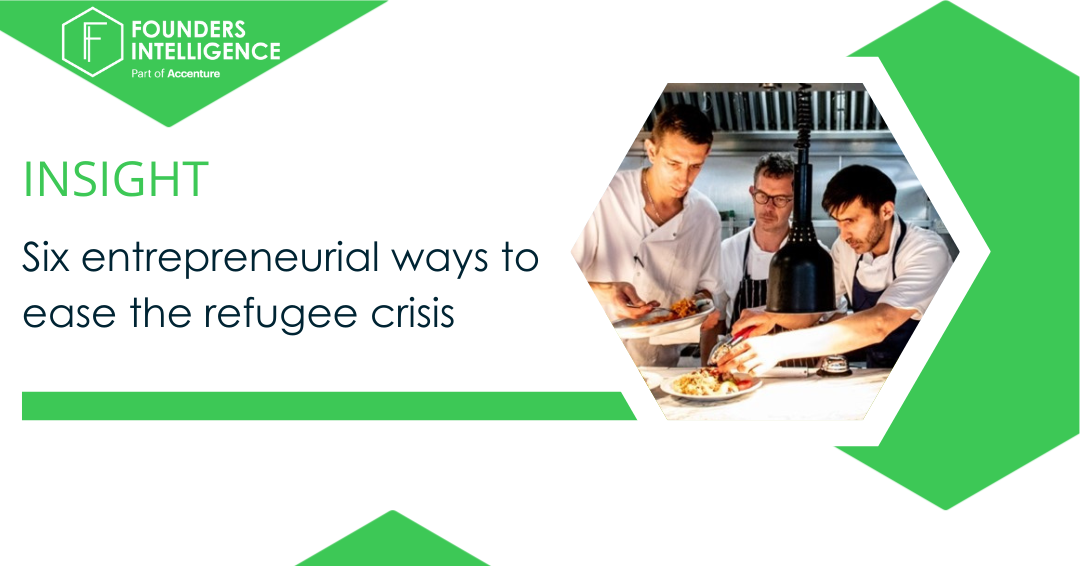Understanding Entrepreneurial Responses
You don’t need to be a start-up to act like one
By Irene Nocivelli, Flora Paterson, Ezra Konvitz, Dale Murray
This pandemic has created a seismic shift in how our companies work. For many, the defining factor in their actions has been speed. Their success in quickly implementing essential operational changes and launching new products has instilled new confidence to consider wider, longer-term entrepreneurial thinking and ways of working.
Speed, however, is only part of the equation. At Founders Intelligence, we’ve seen clients boldly enter new markets and launch company-wide initiatives by embracing collaborative behaviours and harnessing start-ups’ launch-and-learn mentality.
We are helping companies to develop, understand and retain these ways of working, so that they are in a position to thrive whatever the ‘new normal’ throws at them.
In this article, we explore the most impressive responses to the crisis, the quick, bold and entrepreneurial behaviours that enabled them, and what these mean in the long run.

Big business has a heart after all
First reactions to the pandemic pushed companies large and small to embrace a strong entrepreneurial and community spirit. We saw rapid shifts in production lines and workforce allocation in order to manufacture the essential goods needed at this time (e.g. the production of respirators by Ford, GM and Dyson, or hand sanitiser by LVMH and BrewDog). Companies cut dividends and dipped into profit reserves to support communities in need by donating food, money and PPE, and made changes their core messaging to reflect the priorities of this new world.
Why it matters: Purpose is very often built into the core of great start-ups’ business models (e.g. Bulb) playing into a society that demands the companies they buy from (or work for) share their values. This pandemic has shown the extent to which large companies are capable of looking beyond immediate shareholder returns and can act for the greater good — what is yet to be confirmed is the long-term commercial value these actions will have. It’s no longer naive to believe longer-term rewards will accrue to those that have made those moves.
Building the boat while sailing in the storm
Beyond these initial reactions, other changes have accelerated as the pandemic’s constraints and pressures have forced companies to create value in new ways. Channels, customers and processes previously taken for granted no longer exist, forcing organisations to quickly adapt and re-conceive their approaches.
Digital transformation efforts have been first to experience a sharp acceleration. Microsoft has seen ‘two years’ worth of digital transformation in two months’, with companies such as Coca-Cola fully transitioning to Microsoft 365, after discussing the potential of change and relying on a range of poorly connected tools and systems for years. Scottish Water and the Royal Mail implemented strategic digital transformation initiatives that had been expected to take months in a matter of days.
Speed also emerged in other areas: Vodafone took a few days to launch a partnership with Perlego (the Spotify of books), providing customers in lockdown free access to digital books for school or work. Tesco opened new pop-up stores in just two weeks, fuelled by a simplified product range and streamlined operations.
Why it matters: While many of these changes are driven by the pandemic, it is clear their impact will set the stage for organisations across industries to transition to a digital-first mindset. But once the urgency fades, will the normal, slower pace of implementation return? The real opportunity lies in learning from the behaviour that enabled these rapid executions, and re-conceiving teams and processes with a view towards agility and a launch-and-learn mindset.
Risk and reward fly out the window
With the status quo so thoroughly disrupted, companies’ previous governing frameworks for balancing risk and reward have gone out the window. For the bold, the uncertainty of the situation provides a rare opportunity to take actions that might, under ‘business as usual’, be considered too risky from a brand or cost perspective.
Universal Pictures made a strong early play, testing a new route to market by launching the Trolls 2 movie directly via on-demand paid channels like Amazon Prime. In the process, it grossed more in the film’s first 3 weeks than the original Trolls did in 5 months in cinemas. Levi’s took the opportunity to get closer to digital-first customers, launching a new clothing range in partnership with Nintendo and embracing TikTok’s new e-commerce features. And The Madrid Tennis Open and Formula 1 racing satisfied sports-hungry fans by moving online, inviting athletes to compete in live-streamed, video game versions of their sport.
Some firms embraced the chance to collaborate with the competition: Apple and Google joined forces to help trace the spread of the pandemic, and nine energy companies and their CVC arms — among them BP and Enagás — rapidly launched Energía Positiva (‘positive energy’), a collective initiative to back start-ups focused on mitigating the impact of the pandemic in Spain.
Why it matters: Some of these bold moves are undoubtedly risky (AMC Theatres threatened to stop screening all of Universal’s films after the Trolls 2 launch), but could provide the initial data-points to run further experiments in unexplored industry models. In a world where reputation no longer trumps resonance and relevance, the ability to anticipate and react to changing customer needs will determine loyalty. And embracing the opportunity to collaborate with competition for a mutually beneficial cause can elevate their industry as a whole. As the motto goes, ‘one team, one dream’.
Seeing the market in a new light
This pandemic also provides, to the cynical eye, a great opportunity to re-launch previously poorly-received products. It provides the perfect cover for riskier bets, which might fail under more ‘normal’ circumstances, or might have been too early and too digital for their time pre-COVID.
Facebook’s Portal, which launched last year with humdrum adoption, found its perfect target market during the pandemic, providing families with a simple way to connect across households, and with elderly relatives in nursing homes.
Shoppable content is also experiencing a perfect storm; with people stuck at home, players large and small (from NBCUniversal to TikTok) are leveraging a — literally — captive audience and the slowdown of alternative routes to market to ramp up their e-commerce offering (of course, a key challenge being producing new content in lockdown in the first place).
Why it matters: From e-commerce to e-relationships, previously unloved or unviable products are finding an opportunity to shine, as their IRL competitors are put on pause and they find product-zeitgeist fit. Previously established market trends can never be taken for granted, and no strategy should be set in stone. The best entrepreneurs keep their ear obsessively to the ground and focus on finding and maintaining product relevance. Moving into an uncertain future, corporate winners must learn how to build this outward-looking muscle — changing how strategy is set at all levels and building the muscle to take new, often surprising market changes in their stride.
Conclusion
The entrepreneurial spirit is alive in many organisations — often a bit hidden, just waiting for a time to shine. This might be its chance: a moment where everyone has to fight for survival, whether a plucky start-up or a megalith corporate. It’s hugely encouraging and inspiring to see organisations embrace this entrepreneurial spirit; our hope is to see it live on as we return to a sense of normality.
Those who will emerge as winners are already reflecting on how they and their peers embraced this customer-centric, iterative and collaborative mindset, and how they might further these approaches into the future.
The focus, empowerment and creativity we have seen across organisations can be nurtured. Keep this spirit alive to ensure your business is fit for purpose and can respond readily in our new world: set new KPIs related to compliance and risk, break down organisational silos and simplify decision-making.
At Founders Intelligence, we continue working with our clients to pinpoint the root enablers of these behaviours, and help them reimagine their organisations to make the best of these learnings for the future. In Part 4, we explore these details further. You can find more in Part 1 and Part 2.

Founders Intelligence is a team of entrepreneurs and strategy consultants. We help corporates understand how digitally enabled business models are affecting their industries and what to do about it.
Our team has extensive cross-category experience, working with Fannie Mae, Visa Europe, Shell, Unilever, Diageo and numerous other FTSE 100 / Fortune 500 companies.

